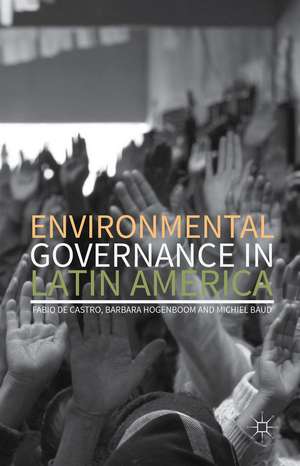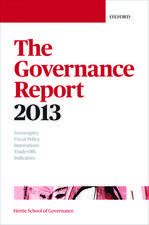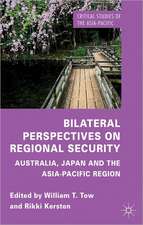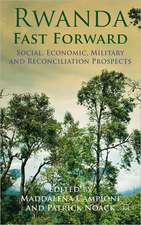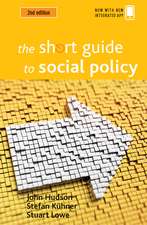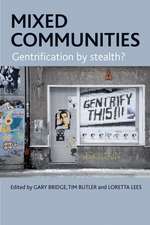Environmental Governance in Latin America
Editat de Fabio De Castro, Barbara Hogenboom, Michiel Bauden Limba Engleză Paperback – 6 ian 2016
The multiple purposes of nature – livelihood for communities, revenues for states, commodities for companies, and biodiversity for conservationists – have turned environmental governance in Latin America into a highly contested arena. In such a resource-rich region, unequal power relations, conflicting priorities, and trade-offs among multiple goals have led to a myriad of contrasting initiatives that are reshaping social relations and rural territories. This edited collection addresses these tensions by unpacking environmental governance as a complex process of formulating and contesting values, procedures and practices shaping the access, control and use of natural resources. Contributors from various fields address the challenges, limitations, and possibilities for a more sustainable, equal, and fair development. In this book, environmental governance is seen as an overarching concept defining the dynamic and multi-layered repertoire of society-nature interactions, where images of nature and discourses on the use of natural resources are mediated by contextual processes at multiple scales.
| Toate formatele și edițiile | Preț | Express |
|---|---|---|
| Paperback (1) | 170.06 lei 6-8 săpt. | |
| Palgrave Macmillan UK – 6 ian 2016 | 170.06 lei 6-8 săpt. | |
| Hardback (1) | 229.33 lei 6-8 săpt. | |
| Palgrave Macmillan UK – 6 ian 2016 | 229.33 lei 6-8 săpt. |
Preț: 170.06 lei
Nou
Puncte Express: 255
Preț estimativ în valută:
32.55€ • 35.37$ • 27.36£
32.55€ • 35.37$ • 27.36£
Carte tipărită la comandă
Livrare economică 21 aprilie-05 mai
Preluare comenzi: 021 569.72.76
Specificații
ISBN-13: 9781137574084
ISBN-10: 1137574089
Pagini: 338
Ilustrații: XII, 338 p.
Dimensiuni: 140 x 216 x 19 mm
Greutate: 0.41 kg
Ediția:1st ed. 2016
Editura: Palgrave Macmillan UK
Colecția Palgrave Macmillan
Locul publicării:London, United Kingdom
ISBN-10: 1137574089
Pagini: 338
Ilustrații: XII, 338 p.
Dimensiuni: 140 x 216 x 19 mm
Greutate: 0.41 kg
Ediția:1st ed. 2016
Editura: Palgrave Macmillan UK
Colecția Palgrave Macmillan
Locul publicării:London, United Kingdom
Cuprins
Introduction: Environment and Society in Contemporary Latin America; Fabio de Castro, Barbara Hogenboom and Michiel Baud
PART I: SETTING THE STAGE
1. Origins and Perspectives of Latin American Environmentalism; Joan Martinez-Alier, Michiel Baud and Héctor Sejenovich
2. Social Metabolism and Conflicts over Extractivism; Joan Martinez-Alier and Mariana Walter
3. Indigenous Knowledge in Mexico: Between Environmentalism and Rural Development; Mina Kleiche-Dray and Roland Waast
PART II: NEW POLITICS OF NATURAL RESOURCES
4. The Government of Nature: Post-Neoliberal Environmental Governance in Bolivia and Ecuador; Pablo Andrade A.
5. Changing Elites, Institutions and Environmental Governance; Benedicte Bull and Mariel Aguilar-Støen
6. Water-Energy-Mining and Sustainable Consumption: Views of South American Strategic Actors; Cristián Parker, Gloria Baigorrotegui and Fernando Estenssoro
7. Overcoming Poverty through Sustainable Development; Héctor Sejenovich
PART III: NEW PROJECTS OF ENVIRONMENTAL GOVERNANCE
8. Forest Governance in Latin America: Strategies for Implementing REDD; Mariel Aguilar-Støen, Fabiano Toni and Cecilie Hirsh
9. Rights, Pressures and Conservation in Forest Regions of Mexico; Leticia Merino
10. Local Solutions for Environmental Justice; David Barkin and Blanca Lemus
11. Community Consultations: Local Responses to Large-Scale Mining in Latin America; Mariana Walter and Leire Urkidi
Afterword: From Sustainable Development to Environmental Governance; Eduardo Silva
PART I: SETTING THE STAGE
1. Origins and Perspectives of Latin American Environmentalism; Joan Martinez-Alier, Michiel Baud and Héctor Sejenovich
2. Social Metabolism and Conflicts over Extractivism; Joan Martinez-Alier and Mariana Walter
3. Indigenous Knowledge in Mexico: Between Environmentalism and Rural Development; Mina Kleiche-Dray and Roland Waast
PART II: NEW POLITICS OF NATURAL RESOURCES
4. The Government of Nature: Post-Neoliberal Environmental Governance in Bolivia and Ecuador; Pablo Andrade A.
5. Changing Elites, Institutions and Environmental Governance; Benedicte Bull and Mariel Aguilar-Støen
6. Water-Energy-Mining and Sustainable Consumption: Views of South American Strategic Actors; Cristián Parker, Gloria Baigorrotegui and Fernando Estenssoro
7. Overcoming Poverty through Sustainable Development; Héctor Sejenovich
PART III: NEW PROJECTS OF ENVIRONMENTAL GOVERNANCE
8. Forest Governance in Latin America: Strategies for Implementing REDD; Mariel Aguilar-Støen, Fabiano Toni and Cecilie Hirsh
9. Rights, Pressures and Conservation in Forest Regions of Mexico; Leticia Merino
10. Local Solutions for Environmental Justice; David Barkin and Blanca Lemus
11. Community Consultations: Local Responses to Large-Scale Mining in Latin America; Mariana Walter and Leire Urkidi
Afterword: From Sustainable Development to Environmental Governance; Eduardo Silva
Notă biografică
Fabio de Castro is Assistant Professor in Environmental Studies and Brazilian Studies at the Centre for Latin American Research and Documentation (CEDLA), University of Amsterdam, The Netherlands. His research interests include local governance of natural resources, protected areas, agrarian transformations, and biofuel expansion in Latin America.
Barbara Hogenboom is Senior Lecturer in Political Science at CEDLA. Her research interests include Latin American policies and politics of mineral extraction and natural resource use, and the influence of China's rise on the region.
Michiel Baud is Director of CEDLA. His research interests includes indigenista ideologies and their influence on present-day academic interpretations of the Andes, the role of ethnic movements in Latin American politics, the construction of collective memories in present-day Latin America and the relationship between ethnic relations and environmental ideas in 19th and 20th century Latin America.
Barbara Hogenboom is Senior Lecturer in Political Science at CEDLA. Her research interests include Latin American policies and politics of mineral extraction and natural resource use, and the influence of China's rise on the region.
Michiel Baud is Director of CEDLA. His research interests includes indigenista ideologies and their influence on present-day academic interpretations of the Andes, the role of ethnic movements in Latin American politics, the construction of collective memories in present-day Latin America and the relationship between ethnic relations and environmental ideas in 19th and 20th century Latin America.
Textul de pe ultima copertă
This book is open access under a CC-BY license.
The multiple purposes of nature – livelihood for communities, revenues for states, commodities for companies, and biodiversity for conservationists – have turned environmental governance in Latin America into a highly contested arena. In such a resource-rich region, unequal power relations, conflicting priorities, and trade-offs among multiple goals have led to a myriad of contrasting initiatives that are reshaping social relations and rural territories. This edited collection addresses these tensions by unpacking environmental governance as a complex process of formulating and contesting values, procedures and practices shaping the access, control and use of natural resources. Contributors from various fields address the challenges, limitations, and possibilities for a more sustainable, equal, and fair development. In this book, environmental governance is seen as an overarching concept defining the dynamic and multi-layered repertoire of society-nature interactions, where images of nature and discourses on the use of natural resources are mediated by contextual processes at multiple scales.
The multiple purposes of nature – livelihood for communities, revenues for states, commodities for companies, and biodiversity for conservationists – have turned environmental governance in Latin America into a highly contested arena. In such a resource-rich region, unequal power relations, conflicting priorities, and trade-offs among multiple goals have led to a myriad of contrasting initiatives that are reshaping social relations and rural territories. This edited collection addresses these tensions by unpacking environmental governance as a complex process of formulating and contesting values, procedures and practices shaping the access, control and use of natural resources. Contributors from various fields address the challenges, limitations, and possibilities for a more sustainable, equal, and fair development. In this book, environmental governance is seen as an overarching concept defining the dynamic and multi-layered repertoire of society-nature interactions, where images of nature and discourses on the use of natural resources are mediated by contextual processes at multiple scales.
Caracteristici
A programmatic analysis and overview of current Environmental Governance in Latin America Culmination of a longterm research collaboration between the contributing authors, funded by the European Union Critically engages with cutting edge work on key topics such as environmental justice or political ecology Unique regional focus on Latin America makes the book highly topical
